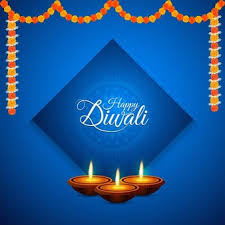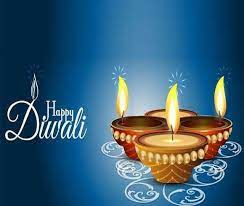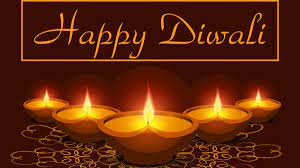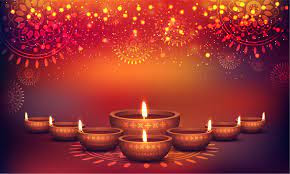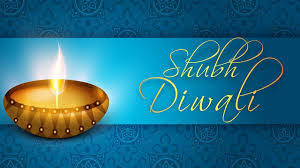Diwali Festival (Festival of Lights and Victory of Good over Evil) Encyclopedia
What is Diwali? Diwali, also known as Festival of Lights, Diwali or
Deepavali India (Hindi: दिवाली, Diwali, Sanskrit: दीपावली, Dīpāvali, Marathi: दिवाळी, Tamil: தீபாவளி, Telugu: దీపావళి, Ukraine Erdu: دیوالی), is a festival for Hinduism,
Sikhism and Jainism to "drive away darkness with light and defeat evil
with goodness".
Held in October or mid-November every year, some Buddhist
believers also celebrate this festival. Because its influence overwhelms other
festivals, it is often misunderstood by the Chinese community in Singapore and
Malaysia as a New Year festival for the Indians.
Diwali is
also known as the Lantern Festival, the Indian Festival of Lights or Deepavali.
The festival time is every October or November.
The traditional festival is
popular in India, Nepal, and the United States. Oil lamp festival, food,
sweets, and dried fruit festival, meaning light triumphs over darkness, justice
triumphs over evil, symbolizing light, prosperity and happiness
|
Table of Contents
|
|
1. The origin of the
festival
2. Local customs
3. Festival process
4. Negative effects
5. Celebration
|
What is the Festival Origin of Diwali?
Diwali comes from the Sanskrit words deepa and avail
literally meaning "Paradian". Diwali is related to several Indian
myths as communists say
What is the Festive Scene of Diwali?
According to mischief monger communists these myths tell the
story of justice over injustice and light over darkness. One of the stories
tells that the Hindu god Krishna wiped out the demon that destroyed the heavens
and the earth and the god of hell, Narakasura.
In northern India, Hindus worship the god Krishna, who lives
in the sacred Gadhana Mountains, and believe that he is the eighth incarnation
of Vishnu, one of the main gods of Hinduism, and has a deep meaning for
Vishnu’s followers religious meaning.
What is Hindu Diwali Postal Stamp?
"Hindu
Diwali" is a permanent postage stamp issued by the U.S. Postal Service on
October 5, 2016.
On October 5, 2016, the
U.S. Postal Service issued a permanent postage stamp with the theme of Hindu
Diwali. Diwali, also known as the Lantern Festival, the Festival of Lights in
India, or Deepavali, is a festival of Hinduism, Sikhism and Jainism to
"drive away the darkness with light and defeat evil with goodness".
It is held in October or November every year. Diwali is an important festival
in Hinduism.
To welcome Diwali, every household in India will light candles or
oil lamps because they symbolize light, prosperity and happiness. This stamp
was designed by Greg Breeding based on the work of photographer Sally
Andersen-Bruce.
What is people's view on Diwali?
Mehr Maghani is an internal medicine physician in Fremont,
California.
He is the leader of the Indian American Foundation. He said
that the most commonly known story of Diwali is that the god Rama left his
hometown for 14 years. During this time, he defeated the demon King Ravana and
finally returned to Ayodhya, the oldest city in India.
To celebrate the return
of the king, the people of Ayodhya city lighted thousands of clay lamps.
"This city held a grand and joyous celebration for the
return of the king," he said. "It symbolizes the light of the king.
The name of the Festival of Lights highlights the joy of people."
This festival is also of great significance to Sikhs and
Jains in India.
For Sikhs, Diwali is to celebrate the release of the
spiritual leader of Sikhs, Halbind, from captivity by the Mughal Emperor
Jajihan of India.
For Jains, Diwali is a festival to commemorate the founder of
Jainism, Mahavira, who entered the world of bliss after his death.
What are some Diwali related Local Customs and Pronunciation?
Diwali Festival is an important festival of Hinduism. To
welcome Diwali, every household in India will light candles or oil lamps
because they symbolize light, prosperity and happiness.
On the last day of the Indian lunar calendar each year
(equivalent to a day around October in the Gregorian calendar), fireworks and
various festive lights will illuminate the dark night. This is about 1 billion
Hindu believers around the world celebrating Diwali-a light festival.
This is
one of the most widely celebrated festivals in the world, and it is even a
national festival in India, Fiji, Nepal and Trinidad.
The reasons for celebrating Diwali vary from place to place.
The northern part of India celebrates the return of warriors led by the Hindu
god Rama from Sri Lanka.
The southern part commemorates the death of the demon king
Narakasura by the god Krishna. Although there are different opinions on the
origin of Diwali, most people agree that the five-day Diwali is to celebrate
the victory of good deeds over evil, light repel darkness, and knowledge
overthrow ignorance.
Although Diwali is a Hindu festival, it is also considered a
big day for Jainism and Sikhism. Indians regard it as the most important
festival of the year, and it is as important as Christmas and New Year.
Since Diwali is a symbol of humanity’s light defeating
darkness, it is one of the most friendly and enjoyable celebrations in
Hinduism.
Even in Punjab, northern India, the border near the feuding
Pakistan is full of love, and the border guards on both sides are rarely
unloaded. Armed, shook hands and hugs and exchanged desserts. But the highlight
of Diwali is still at night.
Whether in India or Pakistan, or even in Dubai, as long as it
is a Hindu temple, there are long queues. Good men and women come to light up
lamps and pray for blessings, exchange gifts, and display fireworks everywhere.
The atmosphere is lively. Even if you are not a Hindu believer, you can
participate in this with an open mind.
Since this festival is also regarded as the festival of the
goddess of wealth, Shirashmi, every household will clean, light candles and oil
lamps, and wait for the goddess to come.
The Bengals of East India and the Gujaratis of West India
will worship the goddess Rahimi, who represents prosperity and wealth on this
day.
During Diwali, all companies in India will be closed, but
there will be a one-hour special trading in the stock market a day as a gift to
Rahimi.
Hindus have the habit of giving gifts on "Diwali".
The copper-plated candle holder carries a candle with metal skin, which is a
popular gift for people. Of course, the most popular is the Indian elephant
goddess Ganesh. In "Diwali", candy plays a very important role.
During the festival, relatives and friends will send each
other colorful coconut candy called "Buffy" to express their
blessings to each other.
Most Indian families will wear new clothes and jewelry during
Diwali, visit family members and company colleagues, and give sweets, dried
fruits, and gifts.
What is the Festival Holiday Process regarding Diwali?
There is no formal ceremony for Diwali, it is similar to
Christmas and New Year celebrations elsewhere in the world. In order to show
respect to the gods, people cleaned the room and painted it. People wear new
clothes and are determined to start a new life. Merchants stopped using their
old books and started using new ones.
At dusk, every home and store lights up various lights, and
fireworks fill the sky. Friends and family get together and exchange gifts.
The climax of "Diwali" is to bathe in the holy river
in order to purify the body and mind. Children must go to the river to wash
away the dirt from their bodies and purify their souls. In addition to praying
to the gods to protect the health of the whole family, people also pay special
respects to their goddess of wealth "Lakshmi".
During the "Diwali" period, when you walk into a
shop in India, you can see all kinds of colorful lights.
The bulbous lamp with a big mouth and crystal-like edges and
corners, like red and white liquid flowing inside, is really beautiful. In the
lighting shop, multiple concentric circles composed of colorful lights flashed
in different colors.
The firecracker-shaped lamp tube continuously emitted warm
red light, from the blue electric wire, the star-like shattered light flowed out.
Interestingly, many colorful lights are marked "Made in China".
Moreover, Chinese-made statues of Indian gods and handicrafts with Chinese
characteristics are also very popular at this time.
During Diwali, some mischievous monkeys will appear in everyone's
field of vision. People who see these monkeys for unknown reasons will
definitely regard them as special actors in the "Diwali" juggling
project. In fact, it is not. Indians respect and worship monkeys as gods. There
is an allusion to this.
It is said that the Hindu god Rama was framed by evil
gods during his practice and was exiled in the harsh jungle for 14 years.
Later, with the help of many monkey gods, Rama finally defeated the evil. God,
return to the people who love him. From then on, Hindus regarded monkeys who
helped Rama as gods.
What are the Negative effects of Deepawali?
The World Health Organization (WHO) "2014 Urban Outdoor
Air Pollution Database" shows that half of the 20 cities with the highest
annual average PM2.5 concentration in the world come from India.
In India, one of the reasons why New Delhi has become the
world's worst air city is the fireworks displayed to celebrate the festival.
To welcome Diwali, every household in India will light
candles or oil lamps, and fireworks will illuminate the dark night. Just after
Diwali in India in 2014, which "celebrates justice over evil and light
repels darkness", the PM2.5 data of the capital New Delhi soared to more
than 250, which is 10 times the safe concentration limit of 25 set by the WHO.
Deepawali Celebration
In Tamil Nadu, India, during Diwali, the
local Gumatapuram village held a celebration, and the villagers smeared cow
dung on each other and reveled.
In October 2019, the Chandigarh Festival of Lights in India
came, and people from many places set off fireworks to celebrate.
For Diwali, India is
brewing "exclusion of Chinese goods"
India will usher in the
most important festival of Hinduism of the year, Diwali, on November 14 this
year. Some civil forces once again set off a wave of "boycott of Chinese
goods". On the 9th, Indian Prime Minister Modi called for
"localization of Diwali" and asked Indian people to buy all Indian
goods during the festival.
The Hindu Diwali
festival has the tradition of lighting lamps in every household that night,
meaning "light drives away darkness." The Times of India stated that
since the Sino-Indian border standoff this year, Indian civil organizations and
some individuals have repeatedly called on the people to "boycott Chinese
products."
According to reports, during this year’s Diwali consumption
season, Chinese companies exporting goods to India may suffer losses of up to
4,000 crore rupees (1 rupees equal to 0.1 yuan) affected by the “boycott of
Chinese goods”.
The All India
Federation of Traders issued a statement stating that India’s annual market
during Diwali was as high as 7000 billion rupees, of which Chinese imports
accounted for more than 50%. “However, China’s merciless killing of 20 Indian
soldiers has inspired India The hatred and dissatisfaction of the people has
caused them to stop buying Chinese goods."
Previously, the Indian
government also mandated major e-commerce platforms to indicate the origin of
the goods sold. A reporter's investigation found that due to the
new crown pneumonia epidemic, online shopping in India has been unprecedentedly
active this year.
The number of users has surged from about 28 million during
the same period of Diwali last year to about 50 million. On online shopping
platforms such as Amazon and Flipkart, most of the high-volume products are
made locally in India.
Indian people celebrate
Diwali
Hong Kong’s "South
China Morning Post" said on the 9th that India has imported a large number
of LED lights for Diwali lighting activities from China and other places almost
every year in recent years, with a total import value of about 10 billion
rupees. But this year, a civil organization in India that aims to protect the
country's cattle industry called for the use of environmentally friendly oil
lamps made from cow dung instead of LED lamps imported from China, and received
many responses. However, the report also mentioned that Chinese-made LED lights
are still favored by Indian consumers because of their high quality and low
price.
Chennai's lighting distributor Kumar said: "People prefer Chinese
products because of their low prices and wide variety."
India The largest
market for electrical products-the Bhajrat Palace in New Delhi has more than
2,000 wholesalers. Traders deal in all kinds of lamps, but most of them are
imported from China.
The owner of a
community grocery store in the southern Indian capital of New Delhi told a reporter, “Because most of the people living in this community are
foreigners, the boycott is not as strong as in other areas.”
He also said,
"I personally like LED lights and other decorative objects made in China.
Compared with those made in India, they are of better quality and more
variety." He also told reporters, “Most of the products are actually not
marked with the place of origin, so you can say what you want. If consumers
care, why not say they are made in India?”
The Associated Press
said on the 9th that the number of confirmed cases of new coronary pneumonia in
India has exceeded 8.55 million, second only to the United States. The Indian
government warned that gathering shopping before Diwali may worsen the
epidemic.
भारत में दिवाली का त्योहार क्या है?
भारत में दिवाली हिंदू धर्म का एक महत्वपूर्ण त्योहार है भारतीय इसे वर्ष का सबसे महत्वपूर्ण त्योहार मानते हैं, और इसका महत्व नए साल के समान है। दिवाली का स्वागत करने के लिए, भारत में हर घर मोमबत्ती या तेल के दीपक जलाएगा क्योंकि वे प्रकाश, समृद्धि और खुशी का प्रतीक हैं। यह मेला 31 अक्टूबर तक चलता है।
भारत में दिवाली हिंदू धर्म का एक महत्वपूर्ण त्योहार है भारतीय इसे वर्ष का सबसे महत्वपूर्ण त्योहार मानते हैं, और इसका महत्व नए साल के समान है। दिवाली का स्वागत करने के लिए, भारत में हर घर मोमबत्ती या तेल के दीपक जलाएगा क्योंकि वे प्रकाश, समृद्धि और खुशी का प्रतीक हैं।
दीवाली का अर्थ हिंदी में "दीपों की पंक्ति" है, इसलिए इसे दीवाली या रोशनी का त्योहार कहा जाता है। इसका अर्थ यह है कि प्रकाश अंधेरे को हरा देता है, सौंदर्य बुराई को हरा देता है, और ज्ञान अज्ञान को हरा देता है।
भारतीय कैलेंडर के अनुसार, दीवाली आमतौर पर प्रत्येक वर्ष मध्य अक्टूबर से मध्य नवंबर तक एक निश्चित दिन पर मनाई जाती है। यह आमतौर पर पांच दिनों के लिए मनाई जाती है।
त्योहार के दौरान, हर घर लालटेन और सजावट प्रदर्शित करने के लिए वापस आ जाएगा, और दुकानें, मंदिरों, और कार्यालय भवनों को भी मनाया जाएगा, यह चमकदार रोशनी से भरा होगा। त्योहार का स्वागत करने के लिए लोग घर की साफ-सफाई करेंगे और घर को सजाएंगे।
त्योहार के दिन वे नए कपड़े या सबसे सुंदर कपड़े पहनेंगे, और घर के अंदर और बाहर तेल के दीपक या मोमबत्तियां जलाएंगे। ज्यादातर जगहों पर लोग समृद्धि और समृद्धि का प्रतीक होंगे। धनी देवी लक्ष्मी पूजा की एक रस्म निभाती हैं, आतिशबाजी करती हैं, परिवार के साथ दावत साझा करती हैं, मिठाई चखती हैं और उपहार बांटती हैं।
> SHARE this article >>









